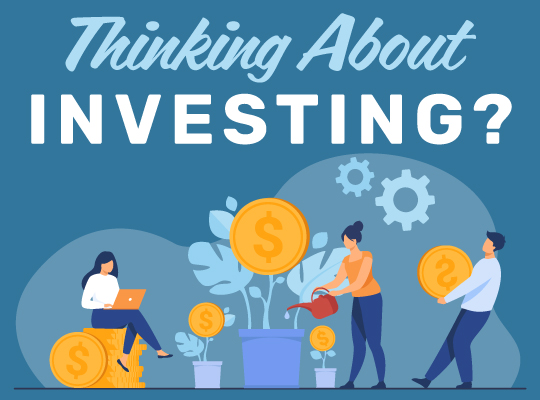Thinking About Investing?
Here's Some Beginner Investing Tips From Brett
So, you know you should be investing and saving for the future but don't know where to start? Well, we sat down with Brett, P1FCU's Financial Advisor, on the Making Sense of Money podcast to get some help on unpacking some of the most common investment questions. Hopefully, what you learn here can help your journey toward financial well-being feel a whole lot more manageable.
Whether you're just starting out or looking to optimize your retirement plan, here is a breakdown of what you need to know.

It Starts with Saving - Not Stocks
Before diving into the world of investing, Brett encourages members to build consistent saving habits. "It doesn't matter if it's $10 a week or $50 a month—what matters is that you're building the habit," he says. Small steps now will lay the foundation for success in the future.
Should You Pay Off Debt Before You Invest?
Ok, your savings plan is on track, but should you pay off your debts before investing? While not everyone's circumstances are the same, the short answer is usually yes. This is especially true when dealing with high-interest debts. It makes more sense to focus on paying off that debt first. Brett explains, "If your debt is costing you 20%, there's no investment that will guarantee that kind of return. Paying off that debt is the best investment you can make."
Learn Basics, Not Jargon (Well, a Little Jargon)
Financial literacy often involves a maze of confusing terms. Still, you can access some great resources if you spend a little time doing the research. Learning can start with making an appointment with a Financial Advisor like Brett or starting with simple resources like YouTube tutorials and using free tools from trusted brokerage platforms. "Kids might not be reading books on finance, but they're watching YouTube. And that's okay. Start wherever you are comfortable." The important thing is just taking that first step.
Start Early and Be Consistent
Taking that step early is so important because, to sum up in two words, compound interest. Compound interests means that your interest earns interest. Let's say you invest $1,000 and earn 5% APY (Annual Percentage Yield). After one year, you have $1,050. The following year, you earn interest on $1,050—not just the original $1,000. That growth snowballs over time.
Also, investing is emotional, and that's okay. Brett reminds us not to let fear push us out of the market during a downturn. The U.S. stock market can be unpredictable, with ups and downs, but historically, it has shown consistent growth. For example, the S&P 500 has delivered an average annual return of about 10% before inflation and around 7% after inflation. 1 This demonstrates the value of being a long-term investor and staying the course through market ups and downs.
Another thing to watch is investing more than you can afford. Instead, start with smaller amounts and build up. Brett says, "You can always increase your contributions. What matters most is making investing a part of your routine."
Brett's Money Tip: Think in Work Hours, Not Just Dollars
The last piece of advice Brett leaves us with is a sound budget tip. Ask yourself how many hours you'll need to work to pay for something. For example, is that $1,000 purchase worth 40 hours of your time? It's a simple mindset shift that can change how you view spending.
You've Got This. Now Let's Get Started.
Investing can feel intimidating, but the key is to start. By starting small, being consistent, and building strong saving habits, you can set yourself up for long-term success. For more budgeting tips, subscribe to the P1FCU Making Sense of Money Podcast and check out previous Basecamp financial tips and tricks.

